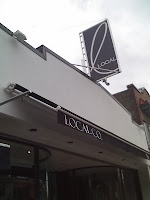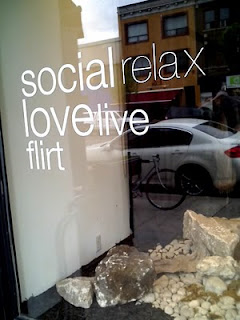
Further to my last post, I’m pleased to present my chat with Chef Trevor Middleton, who’s with The Local Company in Toronto. I think you’ll find his thoughts on food, presentation, and the cultivation of relationships enlightening. Does it get my any closer to defining what “local” means in this day and age? Yes and no. See for yourself.
How would you describe yourself?
I’m a moody bastard.
Where do you source your meat?
It all comes from The Butcher Shoppe. All the meat coming through (there), you have a guarantee -you know it’s Canadian.
The biggest challenge has been getting set up with (local producers).
What about dairy?
I’ll use Mr. Dairy -they source Canadian -but I will also source artisanal stuff, like Quebec organic. And I’ll also use stuff from the street (Danforth Avenue). Sysco is a major supplier to all the restaurants. You have to use it -but I only spend about $500 a week with Sysco, whereas I spend $1400 or $1500 everywhere else. There’s a local market near here, a village market, and I drop $60-$100 a day there.
 How does the word “local” relate to what you do?
How does the word “local” relate to what you do?
It’s a conceptualized name, meant to be a local restaurant, more local to the Danforth. The food philosophy side came with me -this comes from my love and intimacy with food. I’ve done enough fine dining, … (to know) I don’t want run-of-the-mill. I don’t ever want to be known for pretty food; I want a wonderful experience. I want to feel good about myself and what I ate.
A lot of this goes to my childhood. I was raised poor and with Crohn’s disease, and I was always hungry. Because of my own disease, I have to make it work for me, I can’t use garbage. Anything processed makes me sick, and it’ll make you sick along the way too.
What is your ultimate ambition?
My end goal is to teach. I want to be teaching culinary arts within five years. Part of it is, i have a gift with mentoring the young, and taking in lost souls. If you’ve got it together, don’t talk to me. I want someone who’s a f*ck-up, that’s how I heal myself. My former dishwasher is a young man most thought was autistic, and I found out it’s just social anxiety. No one would let him do anything but wash dishes; now he cooks every dish on the menu. He doesn’t have a high school diploma, though I have him enrolled in George Brown as a mature student. He carries that passion for food through his life now.
 What do you think of sensuality as it relates to the restaurant experience?
What do you think of sensuality as it relates to the restaurant experience?
When I worked at The Boilerhouse, they had beautiful food, wonderful execution, they were the best of the best. They had high-level chefs too, but I noticed one thing within a few months, something they tried to beat out of me: they take the rustic-ness out of food. They wanted perfectly trained-out stuff. I want chunks, not perfection. Restaurants take the technique part too far; they forget food is a living thing, that it’s natural, just because it has to be pretty. i think a lot of newer chefs are in a backlash, so now there’s more comfy food again.
What’s the end goal, for you, as a chef?
It’s morphing. At the beginning, it’s like everyone: you want to be a superstar. But really, the greatest experience is to sit down, invite people to have a glass of wine, a good meal, and talk. Dining isn’t just about food, it’s about how you interact – how you interact with your world, your surroundings. I’d rather be known as someone who cooks plain, simple food, more than anything else.
 Do you know the people you buy from?
Do you know the people you buy from?
I do. If I don’t come in, they go, “where have you been?” One Asian lady at the local market, she and her husband always joke with me. Once a week, because of the nature of our relations, they’ll give me a care package to take back to kitchen, I have friendly relationships with local people. There are no pretensions. But I lament not being able to drive hours out to food sources. In the past, I ordered from Echo Bay -they provide grass-fed organic beef -but that means I have to charge more, and when I do, people (customers) complain.
What’s a chef’s job?
To engender respect for agriculture. If i can’t get organic, there are companies that have ethical way of doing business. I don’t want the fancy stuff if it’s not harvested ethically or sustainably.



